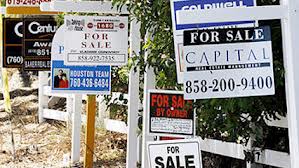 More than a million real estate transactions in the United States since 2009 have been short sales, and the pace is picking up as sellers hurry to avoid a potentially hefty tax bill. The Mortgage Forgiveness Debt Relief Act, a 2007 law that helps borrowers avert taxes when they discharge mortgage debt, is set to expire at the end of the year. Should legislators and White House officials allow the law to expire, a sharp drop in future short sales can be expected.
More than a million real estate transactions in the United States since 2009 have been short sales, and the pace is picking up as sellers hurry to avoid a potentially hefty tax bill. The Mortgage Forgiveness Debt Relief Act, a 2007 law that helps borrowers avert taxes when they discharge mortgage debt, is set to expire at the end of the year. Should legislators and White House officials allow the law to expire, a sharp drop in future short sales can be expected.
According to real estate analytics firm RealtyTrac, the rate of short sales from July to September of 2012 was 35 percent higher than during the same period last year, and more than 40 percent of all real estate transactions in those three months were short sales. This uptick in short sales is welcome news for neighborhoods with a high concentration of homes abandoned due to foreclosure, and it also alleviates the burden on banks that provide maintenance to their Real Estate Owned (REO) properties.
How Mortgage Debt Goes Untaxed
When mortgage debt is discharged through the short sale process, it is normally counted as income realized by the borrower in the eyes of the Internal Revenue Service (IRS). It is also subject to taxation. The average short sale these days is settled at nearly $95,000 less than what is owed on the mortgage, an amount that would usually be added to the seller's adjusted gross income at the end of the year.
The Mortgage Debt Relief Act takes away the tax burden from short sellers. In most cases, borrowers who opt for short sales are underwater and struggling to make monthly mortgage payments. It would be unreasonable to expect them to pay taxes on profits they don't actually realize from short sales.
Why Short Sales Need to Continue
Until the housing market is completely stable, real estate industry analysts think that short sales are a good option to foster economic recovery. Unlike sales of REO properties by banks, short sales are typically occupied by new owners immediately after closing. REO homes tend to languish for months before they are sold.
Another benefit of short sales at this time is the effect they have on the foreclosure inventory. Many lenders have realized that short sales are generally less costly than foreclosures. This in turn stimulates the housing industry by prompting home builders to start new projects that can close the inventory gap.
When homeowners realize they can no longer take advantage of a tax break on a short sale, they may just give up trying to keep their mortgages afloat. Some may even choose to walk away. Failing to extend the Mortgage Debt Relief Act could end up depressing the housing market.



